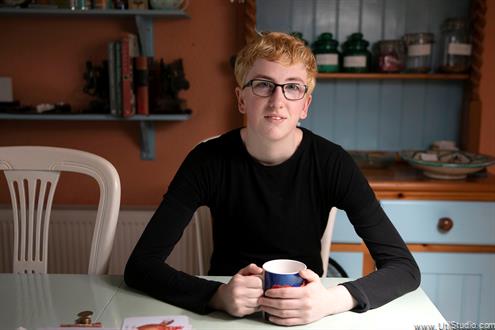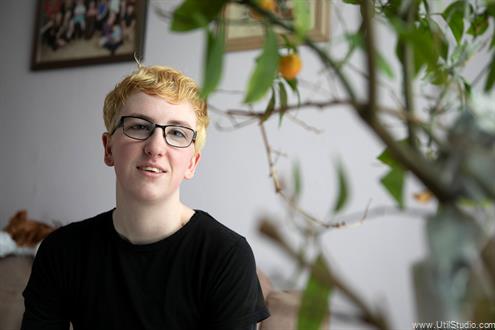INNER torment, fear of rejection and depression marked much of the early life of 21 year old Jamie Walsh, but he is now far happier and hopeful about what the future holds.
What has changed for Jamie is that he can now be open about who he really is and what he feels.
Raised in Shannon as a girl and named Saoirse, it was never a good fit but now he is living with a new name, has embraced his transgenderism and is planning to have hormone therapy within the next year or so.
His mother Donna McGettigan was recently co-opted onto Clare County Council, and last week the two spent an hour of their morning talking about Jamie’s journey, in the sitting room of her Shannon home.
Donna has been supportive all along – when Jamie was deeply depressed, when her only child came out as a lesbian and when she was told that the person she knew as her daughter Saoirse was actually transgender and would be taking on a new identity.
She is still getting used to having a son rather than a daughter, still sometimes refers to Jamie as Saoirse and says ‘she’ rather than ‘he’.
However, this is something that Jamie is very understanding of, and realises that people don’t just turn off habits. “I’m very lucky to have the family like I do. They’ve been trying to get used to the name change, that’s the main thing for them. They do slip up sometimes and that’s okay, I understand it takes time. They’re getting used to it and very supportive of everything that I need to do.”
He used to do the same thing himself not so long ago. “When I was making CVs and stuff I’d still be writing Saoirse. I’d be doing it for so long that it was still what came first.”
Coming out
As a child Jamie was just thought of as a tomboy, but in secondary school it became apparent that the differences were a bit more deep-rooted than they appeared at first sight.
At 16 Saoirse, as he was still known, came out as a lesbian. While both family and friends were very supportive, telling them what had been such a personal secret was extremely hard and frightening. “It was very scary. You don’t know what people are going to think or to say. You might have people who would say it’s okay if you are this or that, but then when it comes down to it, it’s completely different.”
Not only was his mother supportive, she was actually very relieved, as she now felt she knew the cause of a serious depression that had sucked all the happiness out of her teenager’s life. “We had been worried, Saoirse was extremely depressed. We couldn’t figure it out, we were trying everything, we were worried that we’d wake up and would Saoirse still be alive? When Saoirse came out to say she was gay, I was like, is that all it is. I just wanted to say ‘Oh my God, if you had just said that instead of all of this,’” Donna remembers.
Jamie had expected that there would be support, but knew that not everyone is so lucky. “I would have know people whose families were perfect, so loving and caring, but as soon as they came out that was it. A lot of LGBTQ+ kids get kicked out.”
Still searching
Having came out as a lesbian at such a tender age was a lot to go through, and while it did make Jamie happier to a point, there was a very real sense that he was still not living in an identity that fitted comfortably. “There was a reason now that I liked girls, there was a label for it. But there was still something missing and I wasn’t sure what it was.”
At the age of 19, while at Dublin’s Pride Festival, Ireland’s most popular gay event, that the next piece began to fit. “I was only new in the gay community and one of my best friends knew loads of transgender people, drag queens, the whole lot. When I was first talking to them they explained how they realised everything. It just kind of hit me on the spot then, I knew.”
For a second time Jamie made a huge personal disclosure to those close to him, but coming out as a lesbian actually wasn’t as difficult as this, he recalls. “I think it was harder the second time. The first time it’s scary, but I was younger and the older you get the more fear you have. Transgender isn’t just gay or bi, I’m changing my name and stuff. It takes people a lot longer to accept.”
Every day now he wears binders, which flatten out his chest, for hours. “It’s very, very sore. You kind of get used to it though, and now when I don’t wear it I’m confused because I don’t know what way to sit or stand. When you take it off at night it’s a big relief, you can breathe easier.”
He has been on the waiting list for hormone therapy at St Columcille’s Hospital in Loughlinstown in Dublin for a year now. It will probably be another year before he gets a call, but even then he has to be quizzed and deemed transgender before getting any treatment. “It’s a bit backward for someone else to tell you how you feel,” he says, in a rare complaint.
Going through the treatment is not easy, and Jamie admits to being nervous as well as excited about the prospect of having it. It will be like going through puberty again, with his voice and body changing quite dramatically. “The voice change, it takes nearly two years for that to fully happen. Everything else, your face will swell out and slowly sink back to a more masculine jaw line. You lose hair on your head, there’s more hair everywhere else, your whole body changes, your shoulders broaden out.”
He would also like to get what is known as ‘top surgery’ eventually. “The binders would affect my health and if I get top surgery I wouldn’t have to wear them any more. Like most boys I could take off my top and walk around and nothing would be said. But m it is very invasive, that’s the only thing. You can’t get it in Ireland, you have to go to England or Poland.”

190220
Jamie Walsh pictured at home in Shannon on Wednesday.Pic Arthur Ellis.
Acceptance
Studying in Dublin nowadays, Jamie is a regular visitor to Shannon, but is disappointed that the level of acceptance in Clare is far below what it is in the capital. “It’s completely different. I think down here people aren’t as educated about it, there aren’t as many people who have come out or anything. In Dublin you walk down the road and at this stage you will meet many gay people. Generally I think there needs to be more education across the country.”
He feels that young people in Shannon, even some of those he grew up with, are less comfortable with him now than people of the same age in Dublin would be.
While this doesn’t take an aggressive or even explicit form, he is still very conscious of it. “They wouldn’t really say much, because obviously everyone here knows each other, but you can see it by the way they stand beside you or look at you.”
Things are actually more tolerant than they once were, and Donna says she can remember a same sex couple who lived in the Cronan area of the town but moved away after nasty thugs spray-painted derogatory slogans on their house.
While gay couples do live quietly and openly in Shan non now, she is disappointed that life would be more difficult for her son in the town she represents, than it is in Dublin. “There’s a need for more education. I’d love to see a Pride parade down here, I think it would be amazing to have one in Ennis,” the councillor says.
The 21st birthday
When Jamie turned 21 last May the family had a party at Wolfe Tones. Part of the celebrations included the display of a banner saying ‘Happy 20th Saoirse and 1st Jamie’, celebrating both the landmark birthday and the new identity.
On the night many local people found out about Jamie’s story for the first time and there was real warmth. “Everything was geared towards leaving Saoirse behind and becoming Jamie. I couldn’t get over the acceptance that night, people coming over and asking what’s this about. We were explaining and they’d shake Jamie’s hand with a smile on their face,” Donna recalls.
Jamie says that even in liberal Dublin’s gay community there are pockets of antipathy to the very idea of transgenderism, but at that party, in a GAA club in Clare, there was real warmth. “That night everyone was so accepting and you could see the genuine smiles on their faces.”
However, one darker aspect of the celebrations was that several people there praised Jamie for being true to himself and said they knew of others who aren’t comfortable enough to come out. “People were asking what the banner meant and we were explaining. Then the amount of young people who came up and shook Jamie’s hand and said “fair play, I have friends who are afraid to come out,” says Donna.
Jamie says that his own ‘gaydar’ leads him to believe that there are many people around Clare who haven’t felt able to be open. “Being in the (LGBTQ+) community, I hate to say it, but I can kind of see the signs of certain things. I can see down here there are people who haven’t come out, probably not even to their friends, yet.”
On social media much discussion about transgenderism is marked by ignorance and anger. Jamie feels that one feeds off the other and he feels it is important to allow proper discussion without taking offence too readily when people express themselves poorly or display a lack of knowledge about the issues. “I know some people who would get angry, they would probably try and fight you. I just don’t see the point, you’re going to hurt yourself more if you take every little thing on board.”
He feels it is important to be prepared to answer well-intentioned questions, without flying off the handle. “If someone asks a question and you’re getting angry with them, they’re never going to know. If you don’t teach them and you’re complaining that they’re offending you or they don’t know this or know that, how are they supposed to know?”
Love and Support
While attitudes have changed very dramatically in a generation, few people from the LGBTQ+ community will have reached adulthood without having to go through some level of turmoil.
Because of that, there is a lot of willingness to offer help to one another, and Donna says she has noticed how much assistance is shared. “The LGBTQ+ community have a great support network within themselves. When you’re talking about mental health, you have people who are afraid to say they are feeling depressed but Jamie can go to anyone in his group and they’ll help, because they have had to struggle with this all their lives, with something that’s not quite right. I think we all have to learn from that group how to deal with mental health issues in a proper way.”
Jamie agrees there is a lot of support in the circles he moves in, around mental health. “We all kind of have something and we all laugh about it, because it’s just a normal aspect of life.”
He says that in Dublin older members of the community do their best to help newly out people they meet in the city’s gay venues. “You see the younger crowd coming in, especially in the summer and you make time to speak to them. They’re all happy, only newly out, and the older crowd try to make sure they’re okay, that there’s someone there if they need them.”
In the future he wants to volunteer with BeLong To, an organisation for young gay and transgender people, aged 14-23.
While the hormone therapy and surgery are in the future and will bring their own difficulties, Jamie is now on the right road and is able to be himself. It’s really all that his mother wanted for him.
“I’m delighted to see Jamie happy, that’s a parent’s goal. I can’t understand parents that just stop their love for their child because the child says their different to what their parent perceives. I’m just glad that Jamie had the network and could come to us as a family and there was no big deal about it.
“I don’t care what Jamie is, (his) happiness is all I want. Then I can relax and know Jamie is safe, he has his place in the world and all is good.”
Owen Ryan has been a journalist with the Clare Champion since 2007, having previously worked with a number of other publications in Limerick, Cork and Galway. His first book will be published in December 2024.


